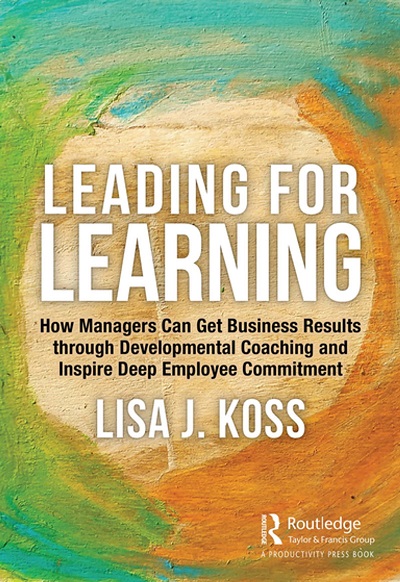In the new book Leading for Learning, Lisa Koss is on a mission to bring development and learning to the forefront of organizational management and leadership. Many of us know that employee development is often a lower priority for businesses, certainly secondary to immediate business goals. Koss calls out the missed opportunities for organizations when they fail to recognize the value of employee contribution. Individuals that feel valued and important are more dedicated and engaged in the organization’s goals.
Leading for Learning provides access to Lisa’s leadership development program, Development Coaching Model (DCM) which is now available in 9 languages and practiced in over 16 countries. The program provides a platform to help organizations move from having people managers to manager-coaches with all the training necessary for that transition.
In the book, Lisa explains her altruistic view that employees choose their place of employment and in doing so deserve that company’s attention to their development. She clarifies that “accepting the position of people leaders means supporting the lives and careers of those that work for you.” As is common with many businesses, managers with the responsibility of managing people have not been properly prepared for the role. Her book addresses the gaps between that development responsibility and why those gaps are becoming more important with the rapid pace of change in the workplace.
In her examination of those gaps, she lays out some foundational ideas. Foremost is her view that the employee or ‘coachee,’ is the crux of successful management-coaching. Establishing trust and understanding the coachee’s motivation is essential. The book reviews the social sciences behind coaching and points out that Maslow’s ‘hierarchy of needs” suggests that motivation changes over time. Lisa suggests that organizations can benefit through manager-coaching by following the individual’s development over time and keeping their motivation linked to the broader organizational context.
AMAZON: https://www.amazon.com/Leading-Learning-Managers-Developmental-Commitment/dp/0367534835
Koss expands on the importance of motivation in a chapter that summarizes research findings on employee engagement, both in the US and globally. The low numbers, she believes, are not surprising given the ongoing disruption in the workplace from new technology and new competitive threats to the newest challenge of COVID. Koss recognizes this change as “highly destabilizing” to employees and to continue to engage employees during this environment, people-managers need to “support employees to cope and prepare for the future,” another rationale for development-coaching.
Another interesting idea that Koss proposes is shifting one’s view of a problem to a dilemma. The distinction, she explains, is that solving a problem is often expedient and short-term, and challenges we face today are more complex. A dilemma “involves two or more options that seem to be incompatible, one belief that gets in the way of another.” Koss sees this shift as “essential to managers who want to promote transformational learning at work.” Why? Because when we think in terms of dilemmas “conversations better expose the root cause and prevailing assumptions, which allow for a thoughtful reexamination.”
These are just a sample of ideas that Koss elaborates on as she introduces and describes her DCM program over the book’s six chapters. Each chapter delves into a particular segment of the program with guidance on implementation. The book also provides a wealth of charts and other resources to guide discussions, identify and overcome common challenges and personal insights from Lisa’s decades of experience in leadership coaching.
Kendall Townsend














